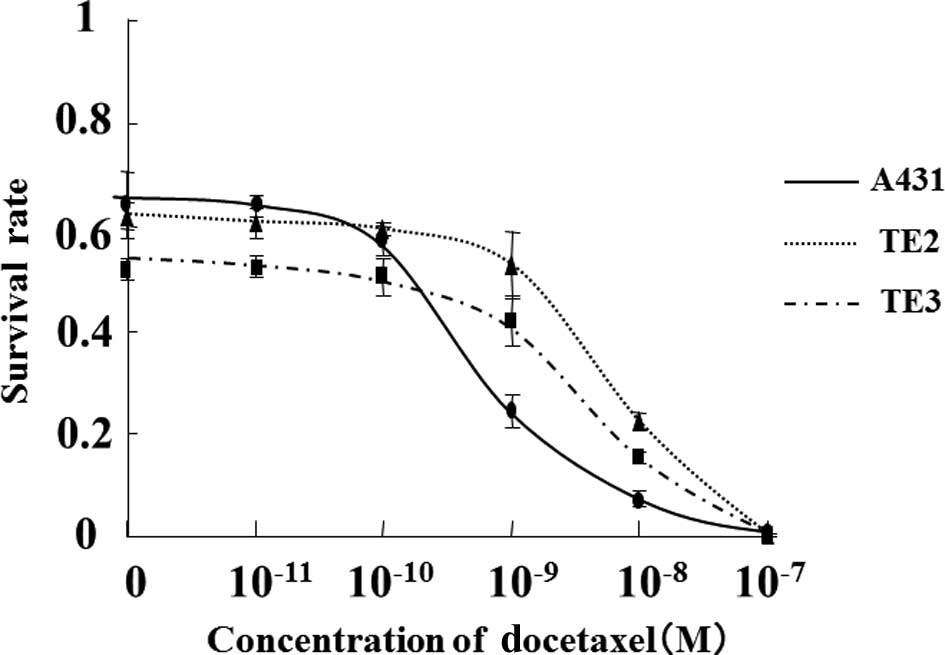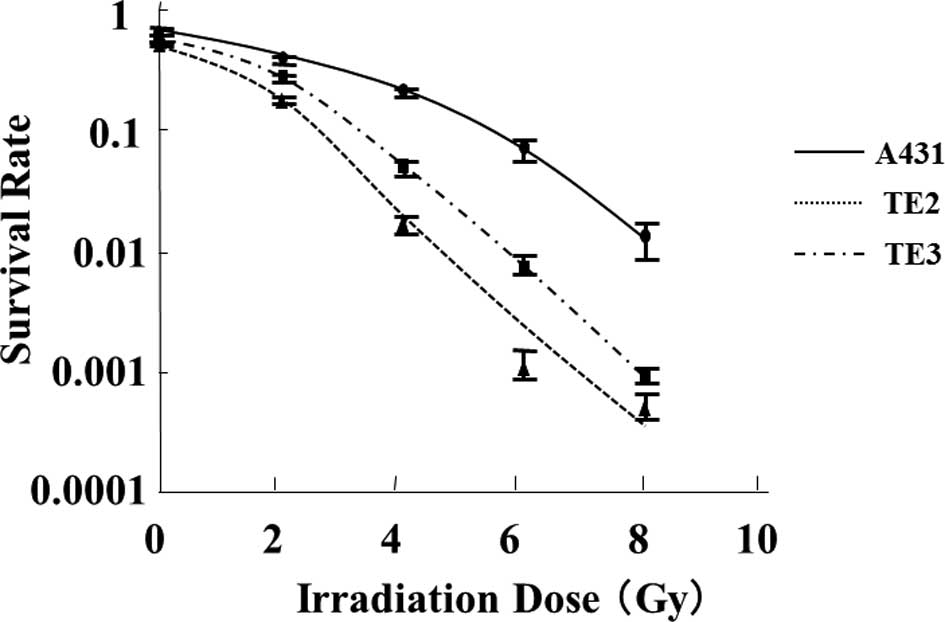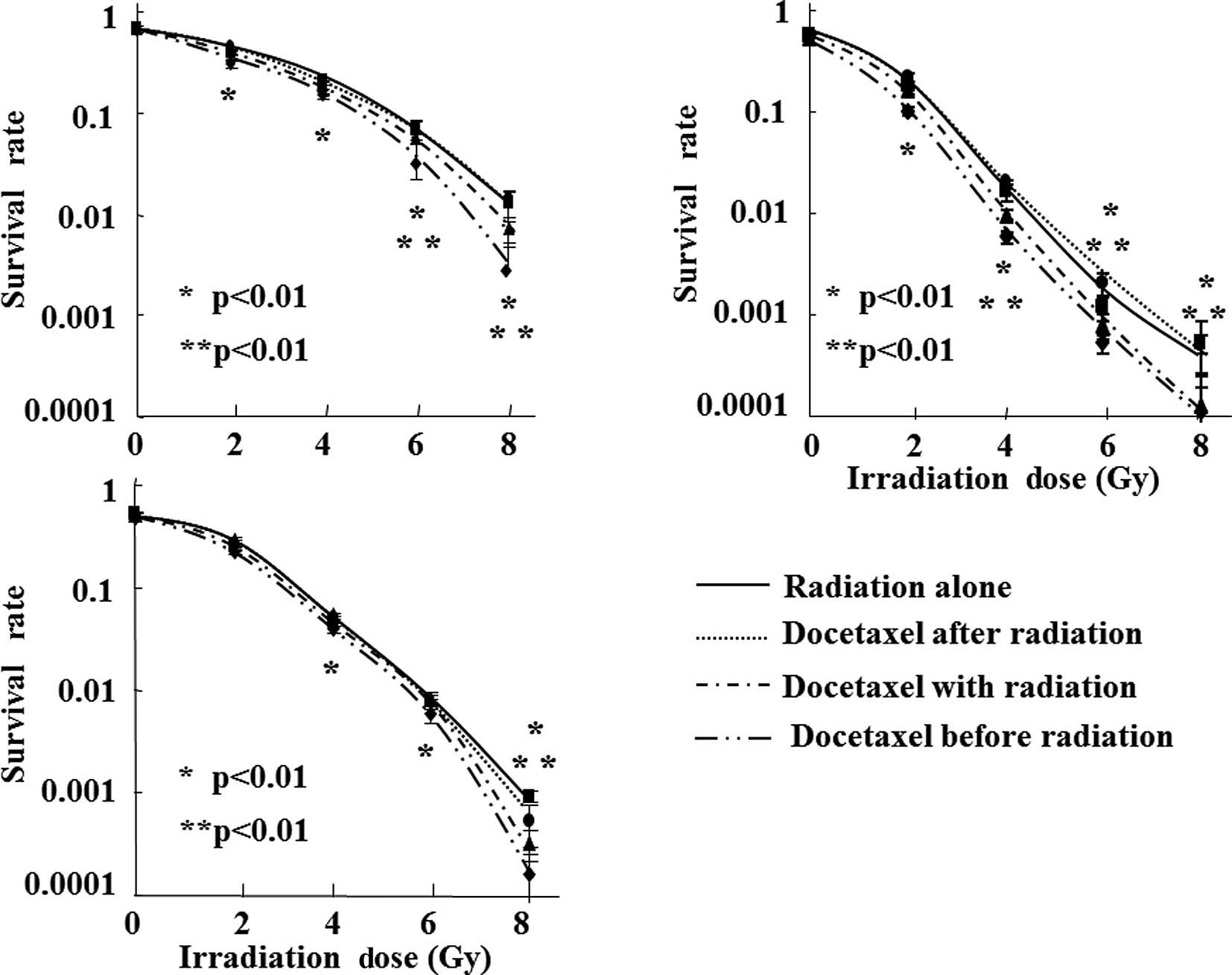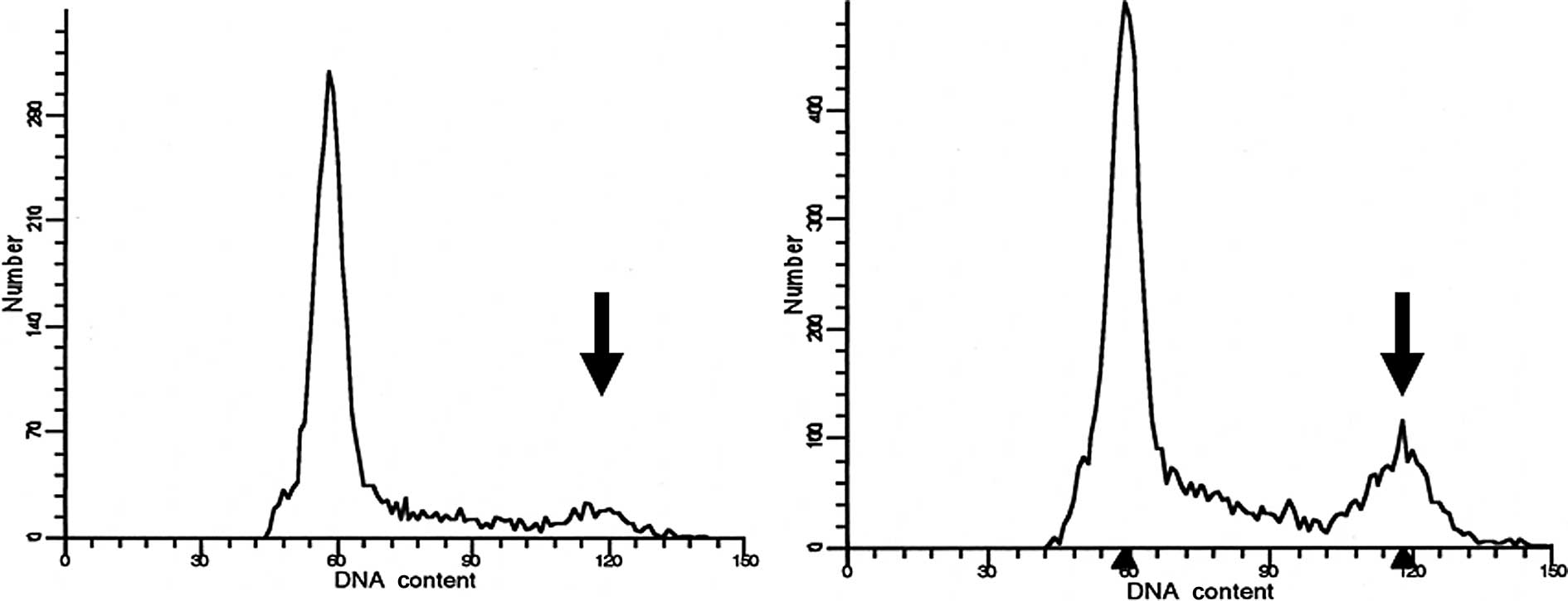|
1.
|
Herskovic A, Martz K, Al-Sarraf M, et al:
Combined chemotherapy and radiotherapy compared with radiotherapy
alone in patients with cancer of the esophagus. N Engl J Med.
326:1593–1598. 1992. View Article : Google Scholar : PubMed/NCBI
|
|
2.
|
Al-Sarraf M, Martz K, Herskovic A, et al:
Progress report of combined chemoradiotherapy versus radiotherapy
alone in patients with esophageal cancer: an intergroup study. J
Clin Oncol. 15:277–284. 1997.PubMed/NCBI
|
|
3.
|
Cooper JS, Guo MD, Herskovic A, et al:
Chemoradiotherapy of locally advanced esophageal cancer: long-term
follow-up of a prospective randomized trial (RTOG 85-01). Radiation
Therapy Oncology Group. JAMA. 281:1623–1627. 1999. View Article : Google Scholar : PubMed/NCBI
|
|
4.
|
Coia LR, Minsky BD, Berkey BA, et al:
Outcomes of patients receiving radiation for cancer of the
esophagus: results of the 1992–1994 patterns of care study. J Clin
Oncol. 18:455–462. 2000.PubMed/NCBI
|
|
5.
|
Ando N, Iizuka T, Ide H, et al: Surgery
plus chemotherapy compared with surgery alone for localized
squamous cell carcinoma of the thoracic esophagus: A Japan Clinical
Oncology Group Study-JCOG9204. J Clin Oncol. 21:4592–4596. 2003.
View Article : Google Scholar : PubMed/NCBI
|
|
6.
|
Ringel I and Horwitz SB: Studies with RP
56976 (Taxotere): a semisynthetic analogue of taxol. J Natl Cancer
Inst. 83:288–291. 1991. View Article : Google Scholar : PubMed/NCBI
|
|
7.
|
Garcia P, Braguer D, Carles G, et al:
Comparative effects of taxol and taxotere on two different human
carcinoma cell lines. Cancer Chemother Pharmacol. 34:335–343. 1994.
View Article : Google Scholar : PubMed/NCBI
|
|
8.
|
Hanauske AR, Degen D, Hilsenbeck SG,
Bissery MC and von Hoff DD: Effects of taxotere and taxol on in
vitro colony formation of freshly explanted human tumor cells.
Anticancer Drugs. 3:121–124. 1992.
|
|
9.
|
Catimel G, Verweij J, Mattijssen V, et al:
Docetaxel (Taxotere): an active drug for the treatment of patients
with advanced squamous cell carcinoma of the head and neck. EORTC
Early Clinical Trials Group. Ann Oncol. 5:533–537. 1994.
|
|
10.
|
Couteau C, Chouaki N, Leyvraz S, et al: A
phase II study of docetaxel in patients with metastatic squamous
cell carcinoma of the head and neck. Br J Cancer. 81:457–462. 1999.
View Article : Google Scholar : PubMed/NCBI
|
|
11.
|
Bang YJ, Kang WK, Kang YK, et al:
Docetaxel 75 mg/m2 is active and well tolerated in
patients with metastatic or recurrent gastric cancer: a Phase II
Trial. Jpn J Clin Oncol. 32:248–254. 2002.
|
|
12.
|
Dreyfuss AI, Clark JR, Norris CM, et al:
Docetaxel: An active drug for squamous cell carcinoma of the head
and neck. J Clin Oncol. 14:1672–1678. 1996.PubMed/NCBI
|
|
13.
|
Mauer AM, Masters GA, Haraf DJ, et al:
Phase I study of docetaxel with concomitant thoracic radiation
therapy. J Clin Oncol. 16:159–164. 1998.PubMed/NCBI
|
|
14.
|
Matsuura M, Hasegawa M, Hayakawa K, et al:
Experimental study of the effects on apoptosis of docetaxel alone
and in combination with irradiation. Oncol Rep. 7:289–293.
2000.PubMed/NCBI
|
|
15.
|
Kim ES and Khuri FR: Docetaxel and
radiation as combined-modality therapy. Oncol (Williston Park).
16(Suppl 6): 97–105. 2002.PubMed/NCBI
|
|
16.
|
Fujii M, Tsukuda M, Sakata B, et al: Japan
Cooperative Head and Neck Oncology Group (JCHNOG). Phase I/II trial
of weekly docetaxel and concomitant radiotherapy for squamous cell
carcinoma of the head and neck. Int J Clin Oncol. 9:107–112. 2004.
View Article : Google Scholar : PubMed/NCBI
|
|
17.
|
Koukourakis M, Kourousis C, Kamilaki M, et
al: Weekly docetaxel and concomitant boost radiotherapy for
non-small-cell lung cancer. A phase I/II dose escalation trial. Eur
J Cancer. 34:838–844. 1998. View Article : Google Scholar : PubMed/NCBI
|
|
18.
|
Segawa Y, Kiura K, Takigawa N, et al:
Phase III trial comparing docetaxel and cisplatin combination
chemotherapy with mitomycin, vindesine, and cisplatin combination
chemotherapy with concurrent thoracic radiotherapy in locally
advanced non-small-cell lung cancer: OLCSG 0007. J Clin Oncol.
28:3299–3306. 2010. View Article : Google Scholar
|
|
19.
|
Choy H, Rodriguez F, Koester S, et al:
Synergistic effect of taxol/taxotere on radiation sensitivity on
human tumor cell lines. Int J Radiat Oncol Biol Phys. 24(Suppl):
274–275. 1992. View Article : Google Scholar
|
|
20.
|
Pradier O, Rave-Fränk M, Lehmann J, et al:
Effects of docetaxel in combination with radiation on human head
and neck cancer cells (ZMK-1) and cervical squamous cell carcinoma
cells (CASKI). Int J Cancer. 91:840–845. 2001. View Article : Google Scholar : PubMed/NCBI
|
|
21.
|
Hennequin C, Giocanti N and Favaudon V:
Interaction of ionizing radiation with paclitaxel (Taxol) and
docetaxel (Taxotere) in HeLa and SQ20B cells. Cancer Res.
56:1842–1850. 1996.PubMed/NCBI
|
|
22.
|
Creane M, Seymour CB, Colucci S and
Mothersill C: Radiobiological effect of docetaxel (Taxotere): a
potential radiation sensitizer. Int J Radiat Biol. 75:731–737.
1999. View Article : Google Scholar : PubMed/NCBI
|
|
23.
|
Mason KA, Hunter NR, Milas M, Abbruzzese
JL and Milas L: Docetaxel enhances tumor radioresponse in
vivo. Clin Cancer Res. 3:2431–2438. 1997.PubMed/NCBI
|
|
24.
|
Mason KA, Kishi K, Hunter N, et al: Effect
of docetaxel on the therapeutic ratio of fractionated radiotherapy
in vivo. Clin Cancer Res. 5:4191–4198. 1999.PubMed/NCBI
|
|
25.
|
Shigematsu N, Kawata T, Ihara N, et al:
Effect of combined treatment with radiation and low dose etoposide
on cell survival. Anticancer Res. 21:325–328. 2001.PubMed/NCBI
|
|
26.
|
Withers HR, Mason K, Reid BO, et al:
Response of mouse intestine to neutrons and gamma rays in relation
to dose fractionation and division cycle. Cancer. 34:39–47. 1974.
View Article : Google Scholar : PubMed/NCBI
|
|
27.
|
Hartwell LH and Weinert TA: Checkpoints:
controls that ensure the order of cell cycle events. Science.
246:629–634. 1989. View Article : Google Scholar : PubMed/NCBI
|
|
28.
|
Dolbeare F, Beisker W, Pallavicini MG,
Vanderlaan M and Gray JW: Cytochemistry for bromodeoxyuridine/DNA
analysis: stoichiometry and sensitivity. Cytometry. 6:521–530.
1985. View Article : Google Scholar : PubMed/NCBI
|


















